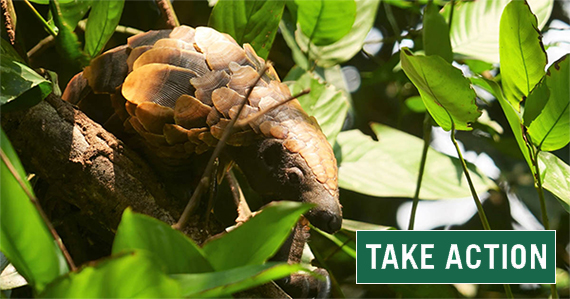Stop the next pandemic! The Natural Places Committee urges Sierrans to act on the important issue of wildlife trafficking. Why do we care about foreign animals when Americans are dying from the pandemics of novel coronavirus and racism? The scientific community currently considers the COVID-19 and previous pandemics to have been primarily caused by transmission of viruses from wildlife species such as bats, rodents, and other animals whose habitats have been disrupted by wildlife trade (Scientific American, June 15, 2020).

Endangered Pangolin (above)
The United States is responsible for 20% of wildlife trade (Smith, 2017). Furthermore, these zoonotic diseases have had a disproportionate impact on Black, Indigenous, and other people of color. The Journal of the American Medical Association reported data that illustrate that “Black and Hispanic Americans are dying at far higher rates from the novel coronavirus than any other groups in the nation” (JAMA, April 15, 2020, p. 1891). Researchers further believe that more pandemics are coming without urgent action (Natural Resources Defense Council, April 14, 2020).
Possible solutions to this crisis include banning international wildlife trade, and increasing U.S. funding for fighting illegal wildlife trade. Therefore, many environmental organizations such as Center for Biological Diversity, Natural Resources Defense Council, Defenders of Wildlife, Endangered Species Coalition, are joining together to stop the public health and racial genocide caused by the virus introduced through wildlife trade. There are several bills relating to wildlife trade in the U.S. Congress. We urge you to contact your United States congressional representatives to let them know how important it is to address this urgent issue and to amend and support the Heroes Act and the PAW and Fin Act to include ENDING WILDLIFE TRADE in order to prevent future health pandemics. Go to www.mdelect.net to find out your representative and senators to the U.S. Congress.
Created by Lily Fountain and the Natural Places Committee team
References
Ashe, D., & Scanlon, J. (June 15, 2020). A Crucial Step Toward Preventing Wildlife-Related Pandemics, Scientific American.
Smith, K. M. et al., Summarizing US Wildlife Trade with an Eye Toward Assessing the Risk of Infectious Disease Introduction, Ecohealth. 2017; 14(1): 29–39. Published online 2017 Feb 7. doi: 10.1007/s10393-017-1211-7
Jones, K., Patel, N., Levy, M. et al. Global trends in emerging infectious diseases. Nature 451, 990–993 (2008). https://doi.org/10.1038/nature06536 https://www.nature.com/articles/nature06536.pdf
World Wildlife Crime Report https://www.unodc.org/unodc/en/data-and-analysis/wildlife.html